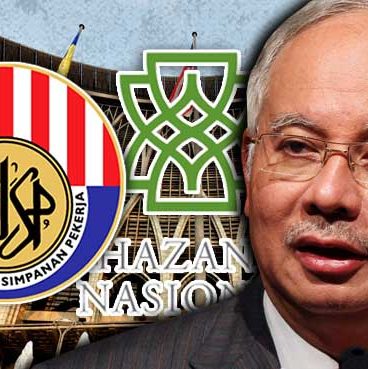
(FMT) – Najib Razak, as both prime minister and finance minister, holds ultimate authority over 7 GLICs which control 35 of Bursa Malaysia’s top 100 companies.
The fact that Prime Minister Najib Razak is also Malaysia’s finance minister allows him to wield considerable authority in state assets and government-linked investment companies (GLICs) such as Khazanah Nasional and the Employees Provident Fund (EPF), political experts say.
This in turn enables Najib to consolidate his hold on power in spite of growing public discontent with his government in some quarters, they said.
In a report today, the Straits Times quoted a new book titled “Minister of Finance Incorporated” by Edmund Terence Gomez, a political economy professor at Universiti Malaya.
In it, Gomez said Najib’s legitimate powers in these corporations influenced the direction of their funds, which served to “entrench” his position within Umno.
According to the report, Najib as both prime minister and finance minister holds ultimate authority over seven GLICs: Khazanah, Permodalan Nasional Berhad (PNB), EPF, Retirement Fund Inc (KWAP), Armed Forces Savings Fund (LTAT), Tabung Haji and Minister of Finance Incorporated (MoF Inc).
These GLICs control 35 of Bursa Malaysia’s top 100 companies, with assets amounting to 42% of the bourse’s RM1.7 trillion market value as of 2013, Gomez said.
Among the government-linked companies (GLCs) controlled by the seven GLICs are Sime Darby, Axiata, Tenaga Nasional Bhd and PLUS Malaysia.
The GLICs also control five of Malaysia’s top banks, including Maybank and CIMB.
“Najib may have realised that he is sitting on a gold mine. One man has become extremely powerful.
This is a significant shift from Umno and its members being key players in the corporate sector, to just the prime minister,” Gomez was quoted as saying.
Malaysia’s arrangement in which the prime minister is also the finance minister was introduced by Dr Mahathir Mohamad during his rule over the country from 1981 to 2003.
Gomez attributed it to Mahathir’s push to create “Malay corporate captains”, many of whom became owners and directors of public-listed companies.
However, Mahathir, who is a fierce critic of Najib, said during a lecture in London last September that the roles of prime minister and finance minister should be separated to avoid a repeat of the financial scandal surrounding state investment fund 1MDB.
“Prime ministers should not be the minister of finance,” he said in a report by The Wall Street Journal.
“We should put a bar to the prime minister becoming the minister of finance.”
Of late, opposition leaders from Pakatan Harapan have also vowed that the prime minister will no longer hold the position of finance minister if the coalition takes Putrajaya in the 14th general election (GE14).
Najib’s authority over government assets came into the spotlight following a visit to Washington earlier this month during which he offered to invest up to US$24 billion in the United States (US).
Several quarters including opposition members and NGOs slammed the prime minister’s offer, pointing out that Malaysians were already suffering from financial difficulties due to the economic slowdown.
They also asked how the Malaysian economy, which is 62.65 times smaller than that of the US, could strengthen its (US) economy.



No comments:
Post a Comment
Note: Only a member of this blog may post a comment.